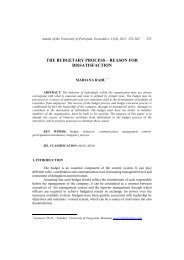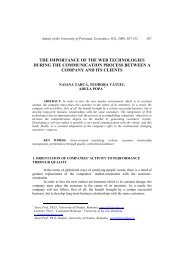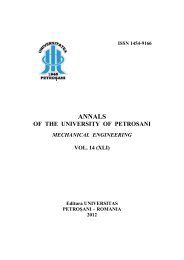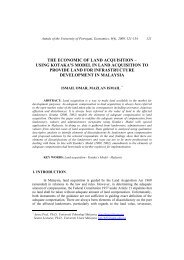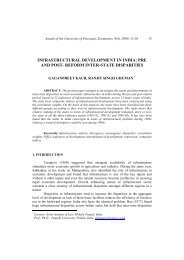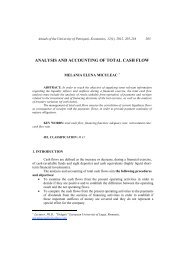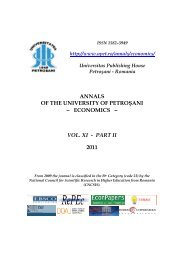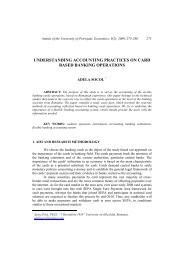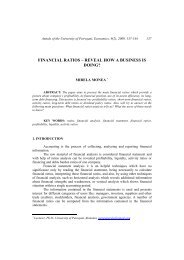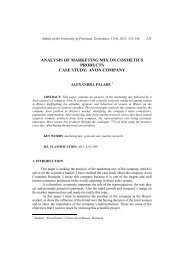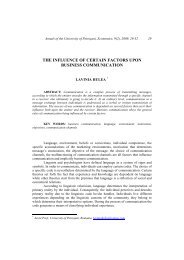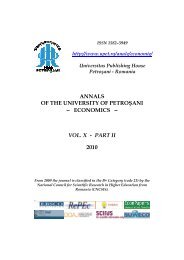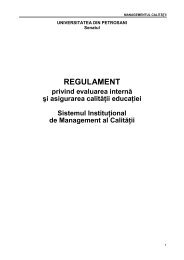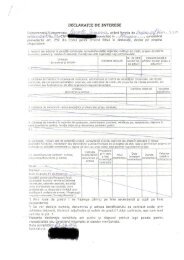annals of the university of petroÅani â¼ economics â¼ vol. xi - part i ...
annals of the university of petroÅani â¼ economics â¼ vol. xi - part i ...
annals of the university of petroÅani â¼ economics â¼ vol. xi - part i ...
Create successful ePaper yourself
Turn your PDF publications into a flip-book with our unique Google optimized e-Paper software.
The Role <strong>of</strong> Accounting Information Writing and Project Implementation 123<br />
conventions common to all societies, and its results are not meant to be published”.<br />
(Capron, 1994).<br />
Management accounting, found in literature (<strong>the</strong> works <strong>of</strong> different authors) as<br />
management, internal, analytical and operational accounting, refers to that type <strong>of</strong><br />
accounting which tends to decompose as analytically as possible <strong>the</strong> activity <strong>of</strong><br />
economic entities, and which must serve managers at different organizational levels,<br />
for <strong>the</strong>ir information needs.<br />
Management accounting provides a detailed picture <strong>of</strong> each and every activity<br />
(hence its name – analytical accounting (Budugan, et al., 2007), focussing mainly on<br />
recording information on collecting and distributing expenditures by purpose and<br />
activities, phases <strong>of</strong> production, cost centres, production costs, purchasing, processing<br />
data in all fields (OMFP nr. 1826/2003 for approving specifications concerning some<br />
measures for organising and controlling management accounting); it is mandatory but<br />
it must be adapted to <strong>the</strong> specific activity.<br />
In Anglo-Saxon literature, managerial accounting (management accounting) is<br />
defined as <strong>the</strong> process <strong>of</strong> recording, processing, analysis, interpretation and<br />
transmission <strong>of</strong> internal financial information used by managers for budgeting,<br />
evaluating and controlling a company’s activity and for correct estimation <strong>of</strong> resources.<br />
In French literature, management accounting deals with cost control,<br />
determining <strong>the</strong> evaluation basis <strong>of</strong> certain balance sheet items, and <strong>the</strong> calculation <strong>of</strong><br />
production cost to be compared to <strong>the</strong> sales price in order to determine <strong>the</strong> efficiency <strong>of</strong><br />
<strong>the</strong> activity. On <strong>the</strong> o<strong>the</strong>r hand, it also helps to forecast costs’ deviations in order to<br />
determine actual costs (Călin, et al., 2008).<br />
Accrual is defined as <strong>the</strong> accounting basis according to which accounting<br />
elements are recognized as <strong>the</strong>y appear, regardless <strong>of</strong> <strong>the</strong> time <strong>of</strong> receipt/payment <strong>of</strong><br />
cash or o<strong>the</strong>r forms <strong>of</strong> compensation.<br />
The Romanian Explanatory Dictionary defines <strong>the</strong> notion <strong>of</strong> “project” from<br />
three different perspectives – economically, technically and as a plan, but in terms <strong>of</strong><br />
management <strong>of</strong> European funds, <strong>the</strong> term must be defined as all <strong>the</strong> actions and<br />
activities organized with <strong>the</strong> intention to achieve certain objectives.<br />
The notion <strong>of</strong> “project” is defined in Manual de auditoria de gestion as being<br />
“an indivisible operation, submitted to a calendar and a budget, and prepared under <strong>the</strong><br />
responsibility <strong>of</strong> an agency”.<br />
According to Mariana Mocanu and Carmen Schuster (2001), <strong>the</strong> project entails a<br />
temporary activities aimed at creating a new product or service and <strong>the</strong> project objectives<br />
aim strictly at <strong>the</strong> project’s specialty in order to reach costs, financing and deadline aspects.<br />
The project is defined as a non-repetitive process which produces a new, unique and welldefined<br />
quantity within specialized organizations (Opran, 2001).<br />
Project accounting should not be limited to <strong>the</strong> recording <strong>of</strong> economic and<br />
financial operations (to be completed at this time according to Minister <strong>of</strong> Public Finance<br />
Order no. 2169/2009 for changing <strong>the</strong> rules <strong>of</strong> accounting procedures for organizing and<br />
conducting public institutions, published in <strong>the</strong> Official Gazette .513 27 July 2009 for<br />
Public Institutions and Minister <strong>of</strong> Public Finance Order no. 3055/2009 for <strong>the</strong> approval <strong>of</strong><br />
accounting regulations in accordance with European directives) to ensure accuracy and



